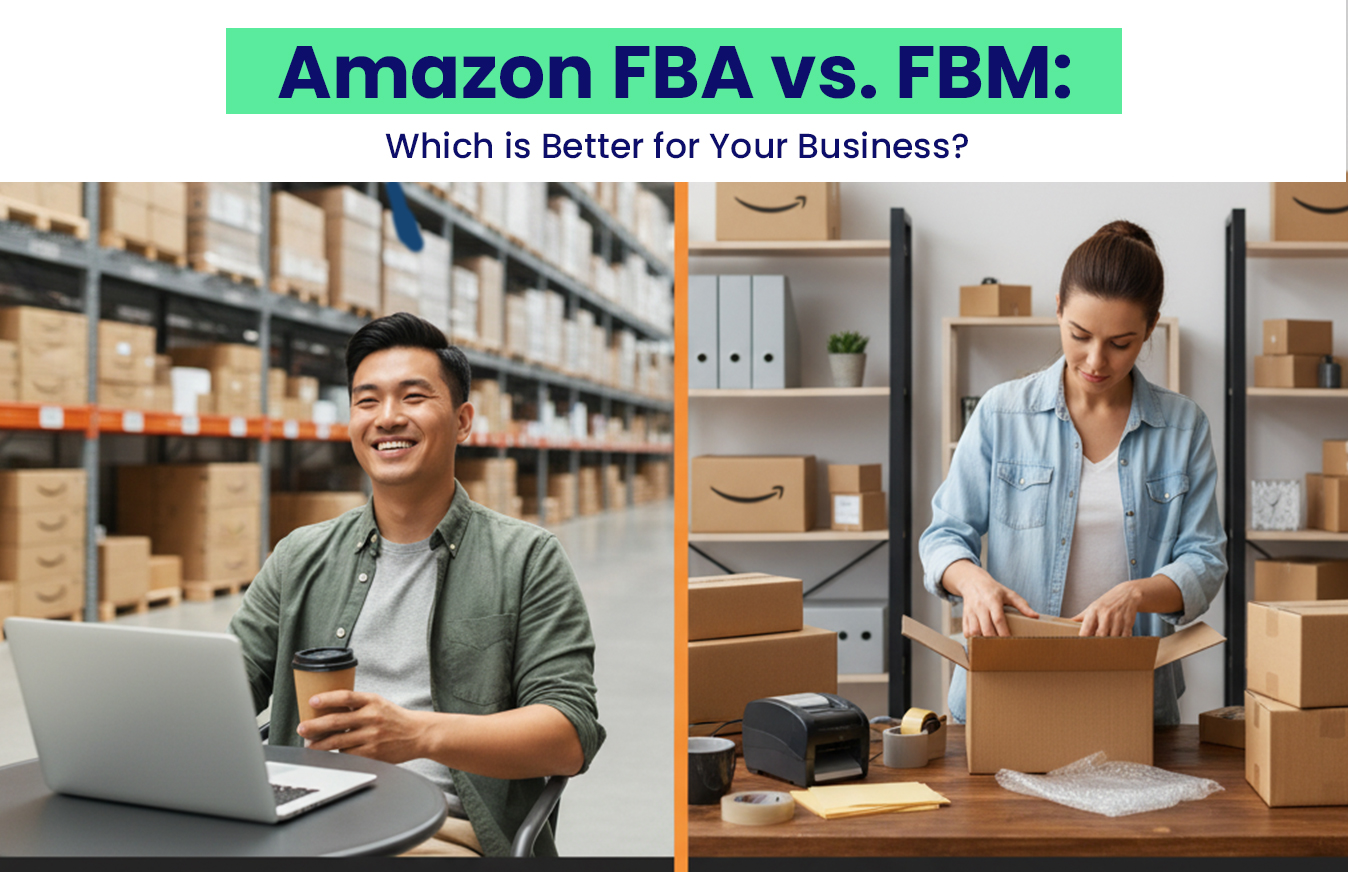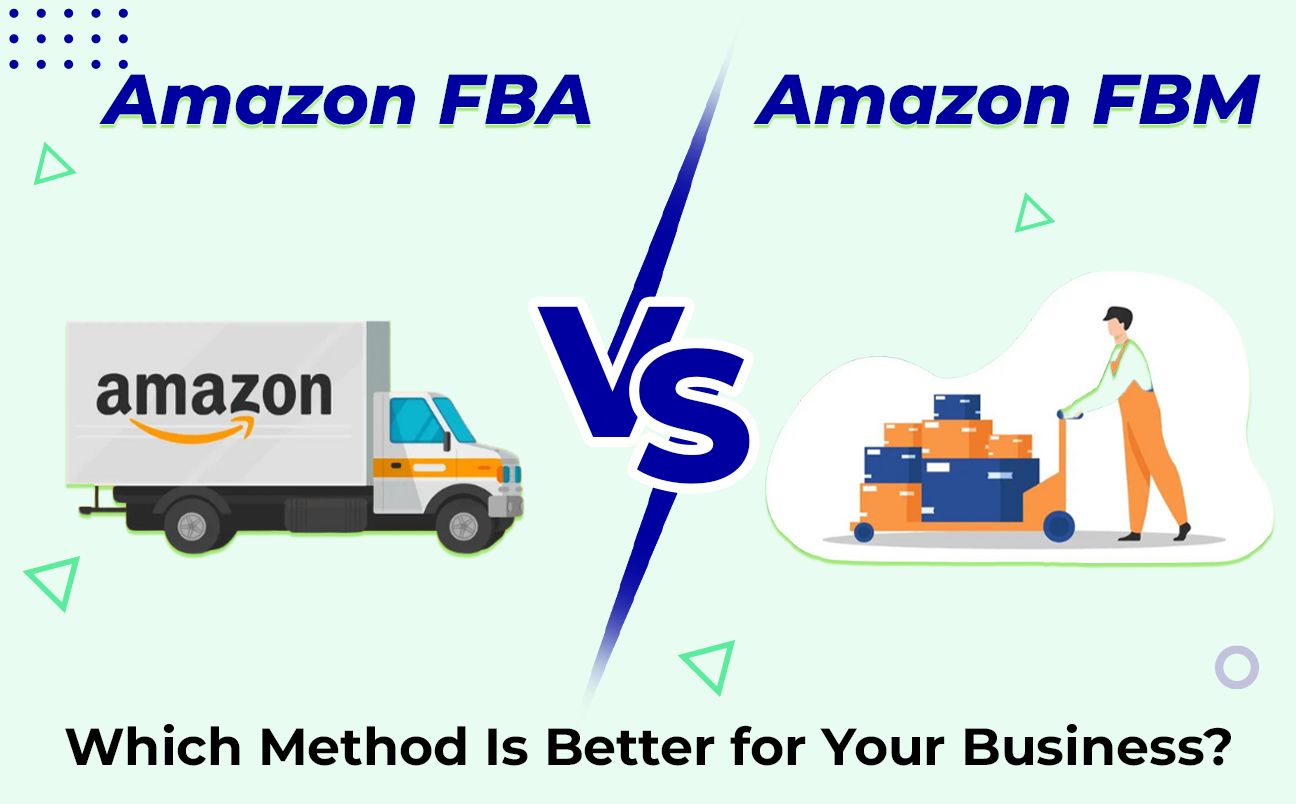These days, Indian e-commerce is growing at a higher rate than before. The sellers never stop seeking ways of increasing sales and profit. The effectiveness of the fulfilment method is a significant choice that all Amazon sellers must make. There are two strategies, which are Fulfilment by Amazon (FBA) and Fulfilment by Merchant (FBM) at Amazon. This knowledge of the advantages and disadvantages of each will make you choose the one that will best fit your business.
Understanding Amazon FBA and FBM
Amazon FBA enables sellers to have products placed in Amazon facilities. Amazon deals with storage, packing, shipping, and customer care. Amazon liberates sellers to concentrate on selling, stock management, and the expansion of their business. Goods sold through FBA are automatically eligible for Amazon Prime, which instils confidence and inspires repeat purchases.
On FBM, sellers handle storage, packing, shipping, and customer service independently. FBM provides the sellers with greater control, and it may be less expensive when dealing with some goods, particularly the large or slow-moving goods. It is also an opportunity to retain closer relationships with customers because sellers will be able to solve returns and inquiries directly.
Key Differences Between FBA and FBM
The advantages of both FBA and FBM are that both are justified, and the correct option will depend on your business and the type of product. FBA fits sellers who desire Amazon logistics, quicker shipping, and Prime clientele. FBM is most effective with sellers who are concerned with the fact that they can control the shipping costs and processes, or with products that do not require fast delivery.
The advantages of Amazon FBA are prime eligibility, customer confidence, extended reach, and time-saving. With FBA, sellers can scale at a rapid pace without having to concern themselves with shipping, customer support, or returns. FBM is cost-controllable, can easily deal with returns, and applies to niche or low-volume products.
FBA vs FBM Comparison: Empowering You to Make the Right Choice
The choice between FBA and FBM involves consideration of some factors.
- Product Type: Fast, small products benefit from the speedy delivery and reduced logistics of the FBA. FBM may work better with large, bulky/slow-moving items.
- Business Model: FBA is frequently chosen by sellers in need of fast expansion and less business logistics. Sellers who need to have direct shipping and support may use FBM.
- Cost Considerations: Evaluate storage, fulfilment, and shipping costs of each alternative and make the choice.
These fees may make FBA more expensive, but it gives access to a broader customer base and greater sales potential. FBM can reduce charges, but will cause increased workload in the transportation management and customer care.
How HRL Infotechs Can Help?
Amazon FBA or FBM may be a challenge for Indian sellers. HRL Infotechs, a company in India with its headquarters in Jaipur, provides Amazon Seller and Account Management Services. With our services, you can save time and increase profits, giving you the peace of mind to focus on other aspects of your business.
Amazon FBA Services in India
HRL Infotechs, a professional E-commerce marketing agency, helps Amazon sellers improve their FBA operations. They do this through a comprehensive onboarding process, where they understand the seller’s business and goals, and then manage their accounts by creating and implementing effective marketing strategies. These critical and practical aspects help sellers increase their visibility on Amazon and make more profit in Amazon’s fulfilment system.
FBA vs FBM Comparison Services
The company also offers professional advice to assist sellers in choosing the most effective fulfilment approach to meet their product mix and objectives. HRL Infotechs compares the sales trends, product size, and logistic expenses to determine which one, FBA or FBM, is more profitable.
Amazon Seller FBA FBM Guidance
Having a profound background in the FBA and FBM management, HRL Infotechs describes the benefits and issues of the two models. Their team assists in the implementation of strategies that increase efficiency, reduce risks, and boost sales in general.
Maximising Amazon FBA Benefits
HRL Infotechs makes Amazon FBA be used to the fullest by the sellers. Their services allow sellers to enjoy Prime access, accelerated delivery, and conversion rates, among other aspects, related to improved inventory management, smarter shipping, and returns.
Benefits of Partnering with HRL Infotechs
There are numerous benefits associated with the decision to make HRL Infotechs a partner:
- Customised Strategies: HRL Infotechs establishes personalised strategies for sellers and increases sales and profit.
- Data-Driven Decisions: HRL Infotechs’ analysts keep an eye on the market, analyse competitors, and provide actionable insights. This data-driven approach enhances performance and ensures that the strategies implemented are based on the latest market trends and customer behaviour, thereby increasing the chances of success for the sellers.
- Time and Cost Efficiency: Outsourcing fulfilment and management will also enable the sellers to focus on expanding the business.
- Enhanced Brand Presence: Store design or content optimisation, HRL Infotechs develops an Amazon brand presence.
- Proven Results: With thousands of accounts under management and millions of orders, HRL Infotechs always brings success in e-commerce.
Conclusion
It is up to your business model, the type of product, and priorities to choose between Amazon FBA and FBM. FBA is convenient with scalable access and Prime, which are suitable for fast-moving products. FBM provides control, flexibility, and cost savings in niche or slow-selling goods.
Use the skills of HRL Infotechs and Amazon FBA services in India to manoeuvre this decision and optimise operations and attain sustainable growth. This is because with their professional assistance, sellers get to maximise profit and provide outstanding service to Amazon customers.
HRL Infotechs is a reliable partner to Indian sellers who want to have smooth operations, increased sales, and a competitive advantage. See what they offer on HRL Infotech’s website now and bring your Amazon business to a new level.

